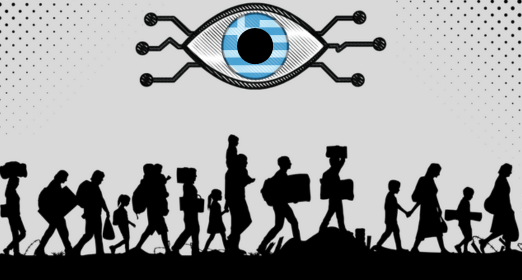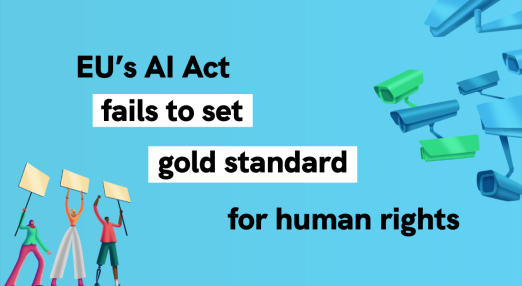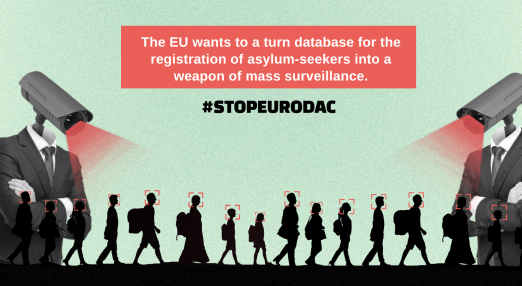migration
Filter by...
-

Non-fitted devices in the UK Home Office’s surveillance arsenal: Investigating the technology behind GPS fingerprint scanners
Privacy International’s technical research on the so-called non-fitted devices (NFDs) used by the UK Home Office to track migrants shows that these devices are intrusive and stigmatising by design. The use of NFDs is an expansion beyond the use of GPS ankle tags of the UK’s surveillance of migrants who are on immigration bail and subject to electronic monitoring conditions.
Read more
-

Surveilling Europe’s edges: when digitalisation means dehumanisation
In May 2024, Access Now’s Caterina Rodelli travelled across Greece to meet with local civil society organisations supporting migrant people and monitoring human rights violations, and to see first-hand how and where surveillance technologies are deployed at Europe’s borders. In the first of a three-part blog series reflecting on what she saw, Caterina explains how, all too often, digitalising borders dehumanises the people trying to cross them.
Read more
-

Statement: EU takes modest step as AI law comes into effect
The EU Artificial Intelligence (AI) Act will finally come into force on August 1, 2024. While it's disappointing that the final law did not put people and their rights at the centre, it still contains some silver linings.
Read more
-

Greek Ministry of Asylum and Migration face a record-breaking €175,000 fine for the border management systems KENTAUROS & HYPERION
On 3 April, the Greek Data Protection Authority (DPA) slapped the Ministry of Asylum and Migration with a record-breaking €175,000 fine under the General Data Protection Regulation for the border management systems KENTAUROS and HYPERION. The DPA’s investigation started back in 2022, following a strategic complaint filed by the EDRi member Homo Digitalis and its partners in Greece.
Read more
-

EU’s AI Act fails to set gold standard for human rights
A round-up of how the EU Artificial Intelligence (AI) Act fares against the collective demands of a broad civil society coalition that advocated for prioritising the protection of fundamental human rights in the law.
Read more
-

#PrivacyCamp24: Event summary
On January 24, 2024, we brought together policymakers, activists, human rights defenders, and academics from all over Europe for Privacy Camp 2024. We came together to explore the theme ‘Revealing, Rethinking, and Changing Systems’.
Read more
-

Civil society calls for an end to the expansion of EU’s EURODAC database
Civil society is calling for an end to the expansion of EURODAC, the EU database for the registration of asylum-seekers. EURODAC is being transformed into an expansive, violent surveillance tool that will treat people seeking protection as crime suspects.
Read more
-

Civil society statement: Council risks failing human rights in the AI Act
In the run up to EU AI Act trilogue negotiation, 16 civil society organisations are urging representatives of the Council of the European Union to effectively regulate the use of AI systems by law enforcement, migration control and national security authorities in the legislation.
Read more
-

All eyes on EU: Will Europe’s AI legislation protect people’s rights?
As the EU’s AI Act moves into the final phase of negotiations, key battles arise for the protection of human rights.
Read more
-

The EU must respect human rights of migrants in the AI Act
Amnesty International Secretary General Agnès Callamard has sent an open letter calling on the Rapporteurs and members of leading committees on the EU Artificial Intelligence Act (AI Act) to prohibit the use of certain artificial intelligence (AI) systems which are incompatible with human rights of migrants, refugees, and asylum seekers in the AI Act.
Read more
-

As AI Act vote nears, the EU needs to draw a red line on racist surveillance
The EU Artificial Intelligence Act, commonly known as the AI Act, is the first of its kind. Not only will it be a landmark as the first binding legislation on AI in the world – it is also one of the first tech-focused laws to meaningfully address how technologies perpetuate structural racism.
Read more
-

#PrivacyCamp23: Event summary
In January 2023, EDRi gathered policymakers, activists, human rights defenders, climate and social justice advocates and academics in Brussels to discuss the criticality of our digital worlds. We welcomed 200+ participants in person and enjoyed an online audience of 600+ people engaging with the event livestream videos. If you missed the event or want a reminder of what happened in a session, find the session summaries and video recordings below.
Read more
